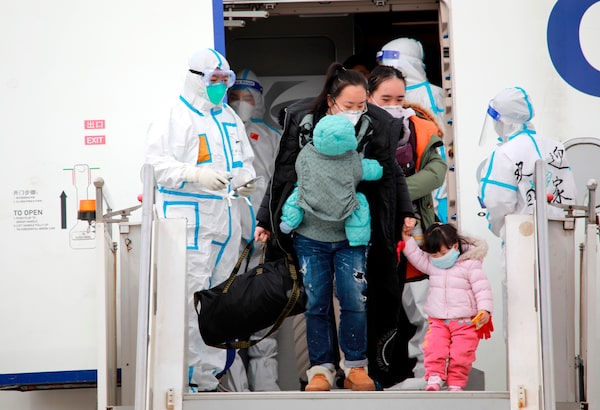
In this photo released by China's Xinhua News Agency, Chinese evacuees from Ukraine arrive at Lanzhou Zhongchuan International Airport, on March 6.Du Zheyu/The Associated Press
The relationship between Beijing and Moscow remains strong “no matter how precarious and challenging the international situation,” Chinese Foreign Minister Wang Yi said Monday.
China has faced intense international pressure to condemn Russia’s invasion of Ukraine, with many in the West seeing Beijing’s silence on this issue as tacit support for Moscow.
Chinese President Xi Jinping met with Russian President Vladimir Putin in Beijing last month, and the two released a joint statement blasting NATO expansion and criticizing the West. In the wake of the war, Chinese officials have refused to describe it as an invasion while recognizing Moscow’s “legitimate security concerns.” Beijing also abstained from two motions criticizing Russia at the United Nations.
While it has been reported that Mr. Putin briefed Mr. Xi of his intention to invade Ukraine, some commentators have suggested China may have been misled about the extent of the military operation and now regrets signalling support for Russia ahead of an invasion that has made it a global pariah.
There was no sign of that Monday, with Mr. Wang saying the joint statement sent “an unequivocal message to the world that China and Russia jointly opposed attempts to revive the Cold War mindset or provoke ideology-based confrontation.”
Speaking at a tightly controlled news conference on the sidelines of the National People’s Congress in Beijing, he said China’s relations with Russia were “rock solid,” describing ties between the two countries as “one of the most crucial bilateral relationships in the world.”
“There is a bright prospect for co-operation between the two sides,” Mr. Wang said. “Relations between China and Russia will not be influenced by any third party.”
Asked about Ukraine, he reiterated Beijing’s support for peace talks but quoted a Chinese proverb in saying, “It takes more than one cold day to freeze three feet of ice.”
Numerous observers have suggested China could play a role in bringing about an end to the conflict, given its strong ties to both Russia and Ukraine. Speaking to Spanish newspaper El Mundo last week, European Union foreign-policy chief Josep Borrell said Beijing is the only logical choice for the role of peacemaker.
“There is no alternative. We cannot be the mediators, that is clear,” he said. “And it cannot be the U.S. either. Who else? It has to be China.”
On Monday, Mr. Wang said Beijing “stands ready to play a constructive role and mediate with the international community when necessary.” He pointed to a call between Mr. Xi and Mr. Putin on Feb. 25 in which the Chinese leader said he supported Moscow’s efforts to “resolve the Ukraine crisis via dialogue.”
“Russia and Ukraine have since had two rounds of talks,” Mr. Wang said. “We hope an upcoming third round makes further progress.”
In a call with Mr. Wang last week, Ukrainian Foreign Minister Dmytro Kubela said he “looked forward to China’s mediation efforts for the ceasefire,” though it remains unclear how much Kyiv will view Beijing as a neutral party given its continued support for Moscow.
Monday’s news conference, which ran for more than 100 minutes, was dominated by Ukraine, but Mr. Wang had far more criticism for Washington’s role in the crisis than Moscow’s.
Beyond Eastern Europe, he accused the U.S. of “provoking China on issues concerning our core interests” and trying “to piece together small blocks to suppress China,” an apparent reference to new alliances pushed by Washington in Asia.
“These actions undermine the overall China-U.S. relations and disrupt and erode international peace and stability,” Mr. Wang said. “This is not how a responsible power should act.”
Beijing reacted angrily last week after a delegation of former senior U.S. defence and security officials visited the self-ruled island of Taiwan, which China regards as part of its territory.
An annual budget released Saturday included a 7.1-per-cent increase in China’s military spending, as analysts warned the balance of power on either side of the Taiwan Strait is increasingly tilting in Beijing’s favour. In the past year, Chinese military aircraft have flown repeated sorties near Taiwanese airspace, and the People’s Liberation Army has staged military exercises focused on invading the island.
Some observers have seen parallels between Russia’s invasion of Ukraine and China’s frequent threats to seize Taiwan by force should the democracy declare full independence from the mainland. Mr. Wang rejected that comparison Monday, saying “the Taiwan question and the Ukraine issue are different in nature and are not comparable at all.”
“Taiwan is an inalienable part of Chinese territory, and the Taiwan question is part of China’s internal affairs,” he said.
Civilians flee Irpin, near Ukraine's capital of Kyiv, amid attacks from Russian forces on March 5 and 6 during a shaky ceasefire. Shelling on civilians leaving Irpin on Sunday killed at least three people, including two children, according to a media report distributed by the Ukrainian parliament.
The Globe and Mail
Our Morning Update and Evening Update newsletters are written by Globe editors, giving you a concise summary of the day’s most important headlines. Sign up today.
 James Griffiths
James Griffiths